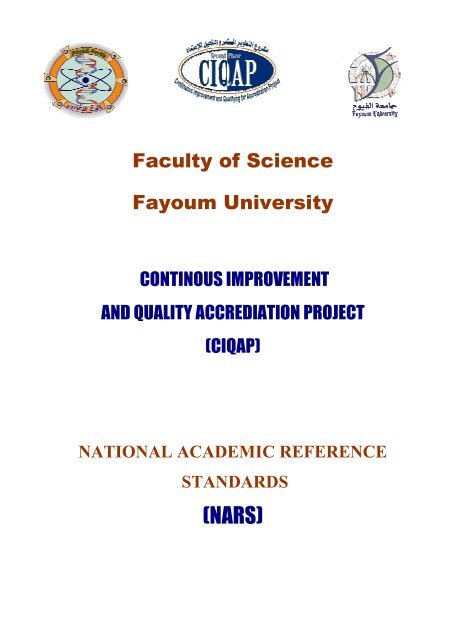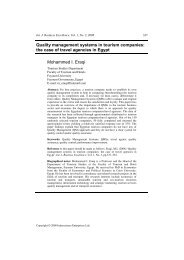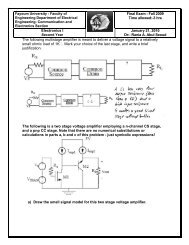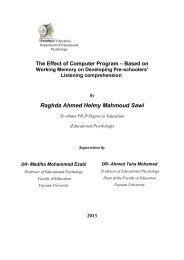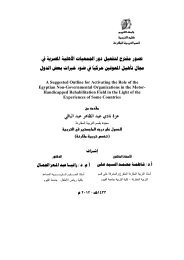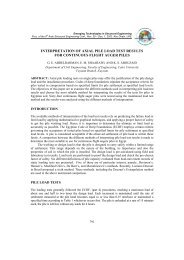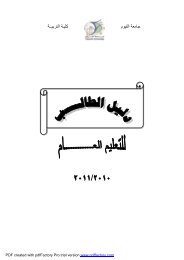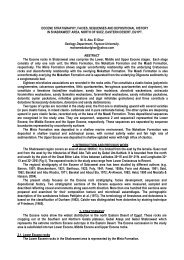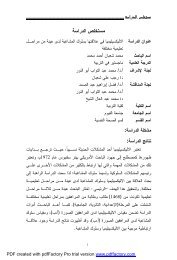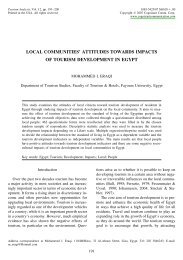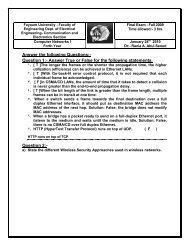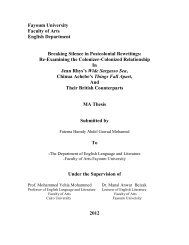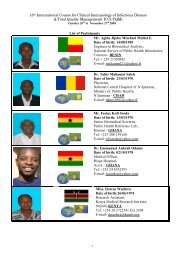National Academic Reference Standards for honors degree
National Academic Reference Standards for honors degree
National Academic Reference Standards for honors degree
Create successful ePaper yourself
Turn your PDF publications into a flip-book with our unique Google optimized e-Paper software.
ب<br />
Faculty of Science<br />
Fayoum University<br />
CONTINOUS IMPROVEMENT<br />
AND QUALITY ACCREDIATION PROJECT<br />
(CIQAP)<br />
NATIONAL ACADEMIC REFERENCE<br />
STANDARDS<br />
(NARS)<br />
٠
Faculty Vision<br />
The Faculty of science at Fayoum University aims to increase the intellectual<br />
knowledge and skills of students as well as the staff members via a package of<br />
advanced intellectual programmes that provide the educational and research<br />
requirements as well as the society needs taking into consideration the ecological<br />
advantage of Fayoum province. This concerns the graduation of students able to<br />
complete in the labor market and to follow the continuous development in the fields<br />
of research skills and innovation in the fields of basic and applied sciences. This will<br />
render our faculty to fulfill the requirements of the academic accreditation.<br />
Faculty Mission<br />
The faculty seeks the preparation and rendering fit graduates which are<br />
distinguished in various basic and applied sciences and qualified up to high scientific<br />
and practical standards. This objective is done via distinguished and well prepared<br />
educational programmes as well as providing the facilities and required powers to<br />
prepare graduate capable to satisfy the requisites of labor market.<br />
This mission is further extended to provide programmers <strong>for</strong> post graduate<br />
studies to offer professional diplomas as well as master and Ph.D <strong>degree</strong>s in which<br />
research works of high originality in basic and applied sciences are carried out. These<br />
studies will share in the development of our natural resources.<br />
The faculty also shares in society services and environment development via<br />
research projects and professional consultation <strong>for</strong> providing the suitable and<br />
practical solutions <strong>for</strong> the existing problems.<br />
١
<strong>National</strong> <strong>Academic</strong> <strong>Reference</strong> <strong>Standards</strong> <strong>for</strong> <strong>honors</strong> <strong>degree</strong><br />
(Biochemistry)<br />
Contents<br />
1- Introduction.<br />
2- Subject knowledge and understanding.<br />
3- Essential skills.<br />
4- <strong>Academic</strong> standards of Bachelors <strong>degree</strong> attainment<br />
5- Per<strong>for</strong>mance Criteria<br />
1- Introduction<br />
These academic standards references characterize the skills and achievements that graduates of<br />
biochemistry-based <strong>degree</strong>s should have dual <strong>honors</strong> <strong>degree</strong>s where Biochemistry <strong>for</strong>ms a<br />
significant proportion.<br />
Biochemistry addresses the chemical principles that underlie biological processes.<br />
Biochemistry seeks to describe the structure, the organization, and function of living matter in<br />
molecular terms. Biochemistry can be divided into 3 principal areas:<br />
- Structural Chemistry; i.e., the study of the components of living matter and the relationships<br />
between biological function and chemical structure.<br />
- Study of Metabolism, i.e., the totality of chemical reactions occurring in living matter.<br />
- Molecular Biology, i.e., the chemistry of processes and substances that store and transmit<br />
biological in<strong>for</strong>mation.<br />
Biochemistry draws its major themes from many disciplines:<br />
- Organic Chemistry, which describes the properties of biomolecules.<br />
- Physiology, which provided understanding of life processes at cell and tissue levels.<br />
- Cell Biology, which describes the biochemical division of labour within a cell.<br />
- Nutrition, which has illuminated metabolism by describing the dietary requirements <strong>for</strong><br />
maintenance of health.<br />
- Microbiology, which showed that micro organisms are ideally suited <strong>for</strong> the elucidation of<br />
many metabolic pathways and regulatory mechanisms<br />
- Biophysics, which uses the techniques of physics to help understand life at the molecular<br />
level.<br />
- Genetics, which describes mechanisms that give a particular cell or organism its<br />
biochemical identity.<br />
- Medical Research, which seeks to understand diseased states in molecular terms<br />
Biochemistry distinctively emphasizes following topics:<br />
- The structures of Biomolecules.<br />
- The reactions that they undergo.<br />
- Enzymes.<br />
- The nature of biological catalysts.<br />
- Elucidation of metabolic pathways and their control.<br />
- The principle that life processes can be understood through the laws of chemistry.<br />
٢
2-Subject knowledge and understanding<br />
B.Sc (Honors) <strong>degree</strong> programs in Biochemistry should:<br />
1. Provide students with Core Knowledge, Understanding and Skills in areas relevant to<br />
Biochemistry and supporting disciplines.<br />
2. Produce skilled and motivated graduates to continue in research or to be employed in related<br />
fields.<br />
3. Cultivate interest in the Biosciences, particularly at the cellular and molecular level<br />
4. Encourage students to develop their full academic potential.<br />
5. Promote the development of a range of key skills, which will be useful in problem-solving<br />
approaches.<br />
3- Essential skills.<br />
At bachelor's <strong>honors</strong> level, students are expected to develop a wide range of different abilities<br />
and skills.<br />
These may be divided into four broad categories:<br />
1. Knowledge and Understanding.<br />
2. Intellectual Skills.<br />
3. Practical Skills.<br />
4. Transferable/Key Skills.<br />
Knowledge and Understanding<br />
1. Basic knowledge in Physics, Chemistry and Biology.<br />
2. Knowledge of the different levels of organization and complexity, from molecules, through<br />
cells, organs, to organisms.<br />
3. The structures and functions of biological molecules and their assemblies.<br />
4. Key metabolic reactions involved in the biosynthesis and degradation of biological molecules.<br />
5. Key processes involved in the control of metabolism, including signal transduction and the<br />
arrangement, expression and regulation of genes.<br />
6. Appropriate practical scientific methods and approaches.<br />
Intellectual Skills<br />
1. Retrieve and select appropriate biochemical and biological in<strong>for</strong>mation.<br />
2. Evaluate primary and secondary evidence and arguments as well as make critical judgments.<br />
3. Analyze and interpret quantitative in<strong>for</strong>mation in graphs, figures, tables and equations and use<br />
appropriate statistical tests.<br />
4. Integrate and link in<strong>for</strong>mation across course components, including material from different<br />
disciplines.<br />
5. Formulate and test hypotheses.<br />
6. Use Simulation program to understand confirm and optimize, his practical techniques.<br />
7. Present data correctly, choose and apply an appropriate basic statistical test and interpret the<br />
output.<br />
8. Plan and conduct a research task.<br />
9. Undertake a supervised project in an industrial or other workplace setting.<br />
Practical Skills<br />
1. Design appropriate experiments and sampling programs in the laboratory, bearing in mind<br />
technical, logistical, safety and ethical limitations.<br />
2. Consider variations inherent in dealing with biological materials such as sample size, accuracy,<br />
calibration and precision.<br />
٣
3. Use appropriate basic laboratory equipment safely and efficiently.<br />
4. Explain the principles and limitations of a range of more advanced practical techniques.<br />
5. Use appropriate software packages to analyze quantitative data and to present results<br />
appropriately with necessary statistical treatment.<br />
Transferable/Key Skills<br />
I-Communication Skills<br />
1. Write structured reports including visualization aids.<br />
2. Give oral presentations.<br />
II-IT Skills<br />
1. Use current networked PC operating systems <strong>for</strong> normal file management<br />
2. Use current common desktop operations software (e.g. Word, Excel … etc.)<br />
3. Use on-line catalogues and databases.<br />
III-Numeracy Skills<br />
1. Use appropriate precisions, scales, units, scientific notations… etc.<br />
2. Use simple algebra and trigonometry and elementary calculus.<br />
IV-Problem-solving Skills<br />
Explore, analyze and find effective solutions <strong>for</strong> problems involving reasonably complex<br />
in<strong>for</strong>mation.<br />
V-Team-work Skills<br />
Work as part of a team to collect data and/or produce reports and presentations.<br />
VI-Self-teaching Skills<br />
1. Developing the skills necessary <strong>for</strong> self-managed and lifelong learning (eg working<br />
independently, time management and organisation skills).<br />
2. Identifying and working towards targets <strong>for</strong> personal, academic and career development.<br />
3. Developing an adaptable, flexible, and effective approach to study and work.<br />
4-<strong>Academic</strong> standards of Bachelors <strong>degree</strong> attainment<br />
1. Pe able to access biochemistry in<strong>for</strong>mation from a variety of sources and to communicate<br />
the principles in a manner appropriate to the programme of study.<br />
2. Have ability in a range of practical bioscience techniques including data collection, analysis<br />
and interpretation of those data, and testing of hypotheses.<br />
3. Have an understanding of the explanation of biological phenomena at a variety of levels<br />
(from molecular to ecological systems) and be able to explain how evolutionary theory is<br />
relevant to their area of study.<br />
4. Pe able to plan, execute and present an independent piece of work (eg a project) within a<br />
supported framework in which qualities such as time management, problem solving, and<br />
independence are evident.<br />
5. Have some understanding of ethical issues and the impact on society of advances in the<br />
biochemistry.<br />
6. Pe able to record data accurately, and to carry out basic manipulation of data (including<br />
qualitative data and some statistical analysis when appropriate);<br />
7. Have developed basic strategies to enable them to update their knowledge of the<br />
biochemistry.<br />
8. Pe able to express relevant biological reactions in chemical terms.<br />
9. Understand how the chemistry and structure of the major biological macromolecules,<br />
including proteins and nucleic acids, determines their biological properties.<br />
10. Understand how the principles of genetics underlie much of the basis of modern molecular<br />
biology.<br />
٤
11. Understand the main principles of gene expression.<br />
12. Know and understand the structure and function of various types of cells in unicellular and<br />
multicellular organisms, the structure and function of cell membranes, cell differentiation.<br />
13. Understand a range of appropriate and relevant experimental techniques and how they are<br />
used; be able to per<strong>for</strong>m some of them.<br />
14. Have a knowledge of cell metabolism, including the main anabolic and catabolic pathways.<br />
15. Have knowledge of enzyme structure and function and of some of the most important<br />
mechanisms controlling the action of enzymes and other proteins.<br />
5-Per<strong>for</strong>mance Criteria<br />
Although all students graduating at bachelor's <strong>honors</strong> level in biochemistry are expected to<br />
demonstrate that they have acquired knowledge, abilities and skills in the areas identified in the<br />
<strong>for</strong>egoing sections, it is accepted that there will be significant differences in their attainment.<br />
Threshold Per<strong>for</strong>mance <strong>for</strong> Bachelors Honors Degrees<br />
Students who are awarded a bachelors <strong>honors</strong> <strong>degree</strong> in biochemistry are expected to<br />
demonstrate knowledge, abilities and skills corresponding on balance to at least attainment level<br />
fair.<br />
Appendix<br />
1. Science sector indicator. (Biochemistry Proposal)<br />
Membership of <strong>Academic</strong> <strong>Reference</strong> <strong>Standards</strong> <strong>for</strong> NARS<br />
Prof. Dr. Ahmed Salem<br />
Ain Shams University<br />
2. Professional syndicates standards.<br />
http://www.qaa.ac.uk/academicinfrastructure/benchmark/honours/biosciences.asp.<br />
The Quality Assurance Agency <strong>for</strong> Higher Education<br />
Membership of the benchmark group<br />
1. Professor Jeffrey Bale<br />
2. Professor Paul Brain<br />
3. Dr Darrell Brooks<br />
4. Dr Sara Churchfield<br />
5. Dr Simon van Heyningen (chair)<br />
6. Dr Kathleen Kane<br />
7. Dr Jackie Landman<br />
8. Professor Caroline MacDonald<br />
9. Professor David Male<br />
10. Professor Roger Marchant<br />
11. Dr Helen O'Sullivan<br />
12. Professor Wendy Purcell<br />
13. Dr James Rimmer<br />
14. Professor Robert Slater<br />
15. Professor Janet Sprent<br />
University of Birmingham<br />
University of Wales, Swansea<br />
University of Central Lancashire<br />
Kings College London<br />
University of Edinburgh<br />
University of Strathclyde<br />
The Nutrition Society<br />
University of Paisley<br />
Open University<br />
University of Ulster<br />
Liverpool Hope<br />
University of the West of England<br />
Aston University<br />
University of Hert<strong>for</strong>dshire<br />
University of Dundee<br />
٥
<strong>National</strong> <strong>Academic</strong> <strong>Reference</strong> <strong>Standards</strong> <strong>for</strong> <strong>honors</strong> <strong>degree</strong><br />
(Chemistry)<br />
Contents<br />
1- Introduction.<br />
2- Subject knowledge and understanding.<br />
3- Essential skills.<br />
4-Per<strong>for</strong>mance Criteria<br />
1- Introduction<br />
These academic standards references characterize the skills and achievements that graduates of<br />
Chemistry-based <strong>degree</strong>s should have:<br />
1- Single <strong>honors</strong> <strong>degree</strong><br />
2- dual <strong>honors</strong> <strong>degree</strong>s<br />
where Chemistry <strong>for</strong>ms a significant proportion.<br />
These references relate to the Chemistry components of all such <strong>degree</strong>s.<br />
The undergraduate program is designed to provide students with an education in the main branches<br />
of the subject, namely, analytical, inorganic, organic, physical and computational chemistry. The<br />
broad objectives of teaching chemistry are summarized in the following definition of education.<br />
Education is learning to appraise data critically, to try to think up an intellectual framework, to be<br />
able to test it, to be able to marshal facts, to be able to write about them, to be able to communicate<br />
with people who may - and almost certainly will - have less knowledge of those facts than you<br />
have, because they will be asking you questions about them with a view to taking some action.<br />
The main aims of bachelor's <strong>honors</strong> <strong>degree</strong> programs in chemistry should be:<br />
1- To instill in students a sense of enthusiasm <strong>for</strong> chemistry, an appreciation of its application<br />
in different contexts and to involve them in an intellectually stimulating and satisfying<br />
experience of learning and studying.<br />
2- To encourage originality of though.<br />
3- To provide students with a broad and balanced foundation of chemical knowledge and<br />
practical skills.<br />
4- To develop in students the ability to apply their chemical knowledge and skills to the<br />
solution of theoretical and practical problems in chemistry.<br />
5- To develop in students, through an education in chemistry, a range of transferable skills, of<br />
value in chemical and non-chemical employment<br />
6- To provide students with a knowledge and skills base from which they can proceed to<br />
further studies in specialized areas of chemistry or multi-disciplinary areas involving<br />
chemistry.<br />
7- To generate in students an appreciation of the importance of chemistry in an industrial,<br />
economic, environmental and social context.<br />
8- To provide students with experience in computing and in<strong>for</strong>mation technology.<br />
9- To provide students with abroad education in fundamental aspects of chemistry and higher<br />
level of knowledge and understanding of subjects.<br />
2- Subject knowledge and understanding.<br />
It is expected that single <strong>honors</strong> <strong>degree</strong> chemistry program will ensure that students become<br />
conversant with the following main aspects of chemistry:-<br />
٦
1. Major aspects of chemical terminology, nomenclature, conventions and units.<br />
2. The major types of chemical reaction and the main characteristics associated with<br />
them.<br />
3. The principles and procedures used in chemical analysis and the characterization of chemical<br />
compounds.<br />
4. The characteristics of the different states of matter and the theories used to describe<br />
them.<br />
5. The principles of quantum mechanics and their application to the description of the<br />
structure and properties of atoms and molecules.<br />
6. The principles of thermodynamics and their applications to chemistry.<br />
7. The kinetics of chemical change, including catalysis; the mechanistic interpretation of<br />
chemical reactions.<br />
8. The principal techniques of structural investigations, including spectroscopy.<br />
9. The characteristic properties of elements and their compounds, including group<br />
relationships and trends within the Periodic Table.<br />
10. Physical and bioorganic chemistry.<br />
11. The constitution and properties of aliphatic, aromatic, heterocyclic and organometallic<br />
compounds, with considerable attention to reaction mechanisms.<br />
12. The nature and behavior of functional groups in organic molecules.<br />
13. The structural features of chemical elements and their compounds, including<br />
stereochemistry.<br />
14. Major synthetic pathways in organic chemistry, involving functional group<br />
interconversions and carbon-carbon and carbon-heteroatom bond <strong>for</strong>mation.<br />
15. The relation between bulk properties and the properties of individual atoms and<br />
molecules, including macromolecules.<br />
16. Methods of studying inorganic compound and its reactions.<br />
17. Awareness of major issues currently at the frontiers of chemical research and<br />
development.<br />
3-Essential skills<br />
At bachelor's <strong>honors</strong> level, students are expected to develop a wide range of different abilities and<br />
skills.<br />
These may be divided into three broad categories :<br />
A- Chemistry-related cognitive abilities and skills, i.e., abilities and skills relating to intellectual<br />
tasks, including problem solving.<br />
The graduate of chemistry program must be able to:<br />
i- Differentiate between the different state of matter, elements and compounds based the<br />
recognition and quantification of the properties.<br />
ii- Explain concepts and determine the efficiency of chemical systems by applying<br />
mathematical expressions.<br />
iii- Elucidate, the stricter of different compounds utilizing chemical and spectral date.<br />
iv-Suggest an acceptable reaction mechanism based an physical kinetic and spectral date.<br />
B - Chemistry-related practical skills, e.g., skills relating to the conduct of laboratory work.<br />
C - Transferable skills that may be developed in the context of chemistry and are of a general<br />
nature and applicable in many other contexts.<br />
The main abilities and skills that students are expected to have developed by the end of their<br />
bachelors <strong>honors</strong> <strong>degree</strong> program in chemistry, are as follows.<br />
٧
A- Chemistry-related cognitive abilities and skills<br />
1. Ability to demonstrate knowledge and understanding of essential facts, concepts, principles<br />
and theories relating to the subject areas identified above.<br />
2. Ability to apply such knowledge and understanding to the solution of qualitative and<br />
quantitative problems of a familiar and unfamiliar nature.<br />
3. Ability to recognize and analyze novel problems and plan strategies <strong>for</strong> their solution<br />
4. Skills in the evaluation, interpretation and synthesis of chemical in<strong>for</strong>mation and data.<br />
5. Ability to recognize and implement good measurement science and practice.<br />
6. Skills in presenting scientific material and arguments clearly and correctly, in writing and<br />
orally, to a range of audiences.<br />
7. Computational and data-processing skills, relating to chemical in<strong>for</strong>mation and data.<br />
B - Chemistry-related practical skills<br />
1. Skills required <strong>for</strong> the conduct of standard laboratory procedures involved in synthetic and<br />
analytical work, in relation to both inorganic and organic systems.<br />
2. Skills in the safe handling of chemical materials, taking into account their physical and<br />
chemical properties, including any specific hazards associated with their use.<br />
3. Skills in the monitoring, by observation and measurement, of chemical properties, events or<br />
changes, and the systematic and reliable recording and documentation thereof.<br />
4. Competence in the planning, design and execution of safely practical investigations, from the<br />
problem recognition stage through to the evaluation and appraisal of results and findings; this<br />
to include the ability to select appropriate techniques and procedures.<br />
5. Skills to use computational tools and packages.<br />
6. Skills to prepare technical reports.<br />
7. Skills to use scientific literature effectively<br />
8. Skills in the operation of standard chemical instrumentation such as that used <strong>for</strong> structural<br />
investigations and separation.<br />
9. Ability to interpret data derived from laboratory observations and measurements in terms of<br />
their significance and the theory underlying them.<br />
10. Ability to conduct risk assessments concerning the use of chemical substances and laboratory<br />
procedures.<br />
C - Transferable skills<br />
1. Presentation skills, student able to express (orally and writing) there understanding of core<br />
chemical principle, the results of experiments, and their analysis of problems.<br />
2. Problem-solving skills, student able to identify the essential parts of a problem and <strong>for</strong>mulate<br />
a strategy <strong>for</strong> solving the problem and able to estimate the solution to a problem, apply<br />
appropriate techniques to arrive the solution, test the correctness of there solution<br />
,interpret their results and connect it to related areas of chemistry.<br />
3. Numeric and computational skills, including such aspects as error analysis, order-ofmagnitude<br />
estimations, correct use of units and modes of data presentation.<br />
4. In<strong>for</strong>mation –technology skills, student should be competent user of basic software, such as<br />
word processing, spreadsheet use, and graphic program, data-logging and storage, internet<br />
communication<br />
5. In<strong>for</strong>mation-retrieval skills, student able to use in<strong>for</strong>mation and communications technology.<br />
6. Interpersonal skills, student able to work independently and as a part of a team, and learn<br />
independently with open - mindedness and critical enquiry.<br />
7. In<strong>for</strong>mation-retrieval skills, student able to use in<strong>for</strong>mation and communications<br />
technology.<br />
8. Interpersonal skills, student able to work independently and as a part of a team, and<br />
learn independently with open - mindedness and critical enquiry.<br />
٨
9. In<strong>for</strong>mation-retrieval skills, student able to use in<strong>for</strong>mation and communications technology.<br />
10. Interpersonal skills, student able to work independently and as a part of a team, and<br />
learn independently with open - mindedness and critical enquiry.<br />
11. Time-management and organizational skills as evidenced by the ability to plan and implement<br />
efficient and effective modes of working.<br />
12. Study skills, needed <strong>for</strong> purpose of continuing professional development.<br />
4-Per<strong>for</strong>mance Criteria<br />
Although all students graduating at bachelor's <strong>honors</strong> level in chemistry are expected to<br />
demonstrate that they have acquired knowledge, abilities and skills in the areas identified in the<br />
<strong>for</strong>egoing sections, it is accepted that there will be significant differences in their attainment.<br />
Threshold Per<strong>for</strong>mance <strong>for</strong> Bachelors Honors Degrees<br />
Students who are awarded a bachelors <strong>honors</strong> <strong>degree</strong> in Chemistry are expected to demonstrate<br />
knowledge, abilities and skills corresponding on balance to at least attainment level fair.<br />
Appendix<br />
1. Science sector indicator.<br />
Membership of <strong>Academic</strong> <strong>Reference</strong> <strong>Standards</strong> <strong>for</strong> NARS<br />
Prof.Nazmi Kassab<br />
Prof. Nadia Kandile<br />
Prof. Ibrahim Shehatta<br />
Dr. Mohamed Rabie<br />
Cairo University<br />
Ain Shams University<br />
Mansoura University<br />
Cairo University<br />
2. Professional syndicates standards.<br />
The Quality Assurance Agency <strong>for</strong> Higher Education 2000.<br />
The Quality Assurance and <strong>Standards</strong> Framework <strong>for</strong> UK Higher Education, the Quality<br />
Assurance Agency <strong>for</strong> Higher Education (QAA)<br />
http://www.qaa.ac.uk/academicinfrastructure/benchmark/honours/chemistry.asp<br />
Chemistry <strong>Academic</strong> <strong>Reference</strong> <strong>Standards</strong> group membership<br />
1. Professor E Abel (Chair), University of Exeter<br />
2. Professor P Atkins Lincoln College, University of Ox<strong>for</strong>d<br />
3. Professor I Haines, University of North London<br />
4. Professor R Jones, The Open University<br />
5. Professor R Kempa, University of Keele<br />
6. Professor M Page, University of Huddersfield<br />
7. Professor B Parsons, NEWI<br />
8. Professor D Phillips, Imperial College, London<br />
9. Professor D Rice, University of Reading<br />
10. Professor K Smith, University of Wales, Swansea<br />
11. Professor A Townshend, University of Hull<br />
12. Professor P Tasker<br />
13. Professor J Winfield, University of Glasgow<br />
14. Dr S Gruber (ex-officio), The Royal Society of Chemistry<br />
٩
١٠
<strong>National</strong> <strong>Academic</strong> <strong>Reference</strong> <strong>Standards</strong> <strong>for</strong> <strong>honors</strong> <strong>degree</strong><br />
(Mathematics)<br />
Contents<br />
1- Introduction.<br />
2- Subject knowledge and understanding.<br />
3- Essential skills.<br />
4- <strong>Academic</strong> standards of Bachelors <strong>degree</strong> attainment.<br />
5- Per<strong>for</strong>mance Criteria<br />
1-Introduction<br />
These academic standards references characterize the skills and achievements that graduates of<br />
Mathematics-based <strong>degree</strong>s should have:<br />
1- Single <strong>honors</strong> <strong>degree</strong>,<br />
2- Dual <strong>honors</strong> <strong>degree</strong>s, where Mathematics <strong>for</strong>ms a significant proportion.<br />
These references relate to the Mathematics components of all such <strong>degree</strong>s.<br />
Mathematics is a major intellectual discipline in its own right, with a pedigree which extends back<br />
through various cultures including the Ancient Greeks to even earlier civilizations. It has its roots<br />
in the systematic development of methods to solve practical problems in areas such as surveying,<br />
mechanical construction and commerce. The subject evolved with the realization that such<br />
methods, when stripped of the details of the particular situations, had a wide range of application<br />
and highlighted the essential common characteristics of many different problems. Thus<br />
generalization and abstraction became important features of the subject. This led to logical<br />
verification propositions concerning abstract entities. Thus mathematics as a subject developed<br />
with watertight arguments and it became a science involving strict logical deduction with<br />
conclusions that follow with certainty and confidence from clear starting points. Consequently<br />
mathematics has made a pre-eminent contribution to the development of human thought.<br />
Mathematics programs today should bring a rich diversity of experiences. Providing a supportive<br />
environment, and in improving curricular and instructional strategies. This diversity challenges<br />
educators to define clear goals and standards, develop effective instructional strategies, and present<br />
mathematics in appropriate contexts.<br />
2- Subject knowledge and understanding.<br />
Undergraduate B.Sc (Honors) <strong>degree</strong> programs in mathematics address:<br />
1- The more general and fundamental topics of Math.<br />
2- Provide a selection of more advanced topics.<br />
3- Develop investigative, mathematical, computational, modeling and other transferable<br />
skills.<br />
4- Students should also study the application of the fundamental principles to particular<br />
areas.<br />
١١
A-Mathematical skills.<br />
B-Transferable skills<br />
3-Essential skills<br />
A-Mathematical skills.<br />
Students should learn:<br />
1- How to <strong>for</strong>mulate, Prove and tackle problems in mathematics. For example, they should<br />
learn how to identify the appropriate mathematical principles, how to use Theorems,<br />
propositions, conjecture,…..conditions in order to estimate and guide their thinking about a<br />
problem and how to present the solutions mathematically, making their assumptions and<br />
approximations explicit.<br />
2- How to plan, execute and report the results of an investigation. They should be able to use<br />
appropriate methods to analyze the data and to evaluate the level of its uncertainty. They<br />
should also be able to relate any conclusions they make to current theories of the<br />
mathematics involved.<br />
3- How to use mathematic to describe the world problems. They should have an understanding<br />
of mathematical modeling and the roles of approximation. They should be able to compare<br />
critically the results of model calculations with those from observation.<br />
4- How to employ technology to enhance mathematical thinking.<br />
B-Transferable skills<br />
A mathematics <strong>degree</strong> should enhance:<br />
I-Problem-solving Skills<br />
1. Involve mathematics students in solving problems with well-define solutions.<br />
2. Students should Gain confidence by trying different approaches and tackling open-ended<br />
problems.<br />
3. Students should develop their ability to <strong>for</strong>mulate problems in precise mathematical terms<br />
and to identify key issues.<br />
4. Students should develop the confidence to try different approaches in order to make progress<br />
on challenging problems.<br />
II-Investigative Skills<br />
1. Students will have opportunities to develop their skills of independent investigation<br />
and mathematical thinking.<br />
2. Students will generally have experience of using textbooks, and other available literature, of<br />
searching databases and of interacting with colleagues to extract important in<strong>for</strong>mation.<br />
III-Communication Skills<br />
1. A mathematics <strong>degree</strong> should develop student's ability to read, write, listen to, and speak<br />
mathematics.<br />
2. A mathematics <strong>degree</strong> should develop student's ability to present complex in<strong>for</strong>mation in<br />
clear and concise mathematical statements.<br />
IV-Analytical Skills<br />
1. Mathematics helps students to learn the need to pay attention to detail.<br />
2. Mathematics helps students to develop their ability to manipulate precise and intricate<br />
ideas.<br />
3. Mathematics helps students to use proper technical language and to construct logical<br />
arguments correctly.<br />
١٢
V- In<strong>for</strong>mation Technology (IT) skills<br />
1. Students will use appropriate technology to enhance their mathematical thinking and<br />
understanding and to solve mathematical problems and judge the reasonableness of their<br />
results.<br />
2. Students will develop their computing and IT (In<strong>for</strong>mation Technology) skills in a variety of<br />
ways, including their ability to use appropriate software and packages.<br />
VI-Personal Skills<br />
1. Students in mathematics programs should develop their ability to work independently.<br />
2. Dealing with others in teams in addition to time management and organization is<br />
acquired.<br />
3. Students are capable to interact constructively with other people.<br />
VII- Practical Skills<br />
1. Students should learn and gain the ability to execute and analyze the results of an<br />
investigation.<br />
2. Students should develop their ability to recognize and be familiar with the computer<br />
laboratory apparatus.<br />
4-<strong>Academic</strong> <strong>Standards</strong> of Bachelors Degree Attainment<br />
1. Mathematics program will model the use of appropriate technology in the teaching of<br />
mathematics so that students can benefit from the opportunities it presents as a medium of<br />
instruction.<br />
2. Mathematics program will model the use of appropriate technology in the teaching of<br />
mathematics so that students can benefit from the opportunities it presents as a<br />
medium of instruction<br />
3. Mathematics Program will actively involve students in meaningful mathematics problems that<br />
build upon their experiences, focus on broad mathematical themes, and build connections<br />
within branches of mathematics and between mathematics and other disciplines so that<br />
students will view mathematics as a connected whole relevant to their lives.<br />
4. Mathematics Program will model the use of multiple approaches:<br />
Numerical, graphical, symbolic, and verbal-to help students learn a variety of techniques <strong>for</strong><br />
solving problems.<br />
5. Mathematics Program will provide learning activities, including projects and<br />
apprenticeships, that promote independent thinking and require sustained ef<strong>for</strong>t and time so<br />
that students will have the confidence to access and use needed mathematics and other<br />
technical in<strong>for</strong>mation independently, to <strong>for</strong>m conjectures from an array of specific<br />
examples, and to draw conclusions <strong>for</strong>m general principles.<br />
5-Per<strong>for</strong>mance Criteria<br />
Although all students graduating at bachelor's <strong>honors</strong> level in Mathematics are expected to<br />
demonstrate that they have acquired knowledge, abilities and skills in the areas identified in the<br />
<strong>for</strong>egoing sections, it is accepted that there will be significant differences in their attainment.<br />
١٣
Threshold Per<strong>for</strong>mance <strong>for</strong> Bachelors Honors Degrees<br />
Students who are awarded a bachelors <strong>honors</strong> <strong>degree</strong> in Mathematics are expected to<br />
demonstrate knowledge, abilities and skills corresponding on balance to at least attainment level<br />
fair.<br />
Appendix<br />
Science sector indicator<br />
Membership of <strong>Academic</strong> <strong>Reference</strong> <strong>Standards</strong> <strong>for</strong> NARS<br />
1. Professor Dr./ A. F. Obada<br />
2. Professor Dr./I. A. Abdalla<br />
2.Professional syndicates standards.<br />
http://www.qaa.ac.uk/academicinfrastructure/benchmark/honours/mathematics.asp<br />
Membership of the <strong>Academic</strong> <strong>Reference</strong> <strong>Standards</strong> group<br />
1. Professor Rob Archbold University of Aberdeen<br />
2. Professor Russell Cheng University of Southampton<br />
3. Professor Neville Davies The Nottingham Trent University<br />
4. Dr John Erdos King's College London<br />
5. Dr Judy Goldfinch Napier University, Edinburgh<br />
6. Mr Gerald Goodall The Royal Statistical Society<br />
7. Mr Tony Palmer De Mont<strong>for</strong>t University<br />
8. Professor Chris Robson (chair) University of Leeds<br />
9. Dr Stephen Ryrie University of the West of England, Bristol<br />
10. Professor Peter Saunders King's College London<br />
11. Dr Stephen Siklos University of Cambridge<br />
12. Professor Joan Walsh University of Manchester (retired)<br />
١٤
<strong>National</strong> <strong>Academic</strong> <strong>Reference</strong> <strong>Standards</strong> <strong>for</strong> <strong>honors</strong> <strong>degree</strong><br />
(Zoology)<br />
Contents<br />
1- Introduction.<br />
2- Subject knowledge and understanding.<br />
3- Essential skills.<br />
4- <strong>Academic</strong> standards of Bachelors <strong>degree</strong> attainment.<br />
5- Per<strong>for</strong>mance Criteria<br />
1- Introduction<br />
These academic standards references characterize the skills and achievements that graduates of<br />
Zoology and chemistry -based <strong>degree</strong>s should have dual <strong>honors</strong> <strong>degree</strong>s where Zoology and<br />
chemistry <strong>for</strong>ms a significant proportion.<br />
Zoology and chemistry has become a topical and important subject relevant to everyone<br />
- Cloning,<br />
- Genetically-modified organisms,<br />
- The human genome project<br />
- The influence of mankind on the environment,<br />
- The potential risks of some foods,<br />
- And many other such topics appear in the media regularly. The biosciences have much to<br />
contribute to the health and wealth of the nation.<br />
We have reached a point in the earth's history where a knowledge of biology (Zoology and Botany)<br />
is essential <strong>for</strong> a viable human future. It is there<strong>for</strong>e important <strong>for</strong> leaders of society whether<br />
industry, business or education to appreciate this and <strong>for</strong> an in<strong>for</strong>med electorate to understand the<br />
scope and limitations of biological knowledge and techniques.<br />
Our object in this statement is there<strong>for</strong>e not so much to describe the factual knowledge that a<br />
graduate in Zoology and chemistry program must have; the subject is too wide and diverse <strong>for</strong> that<br />
to be useful. Rather it is to describe the skills and attributes acquired by the biosciences graduate<br />
that would equip him or her <strong>for</strong> a career in biosciences, and make them valued by employers.<br />
2- Subject knowledge and understanding<br />
Approaches to study and <strong>for</strong>ms of subject knowledge to Zoology and Chemistry <strong>degree</strong> program<br />
will include the following:<br />
1. A broadly-based core covering the major elements defined by the program and providing the<br />
wider context required <strong>for</strong> the subject area, together with specialized in-depth study of some<br />
aspects of the discipline or subject area.<br />
2. Kknowledge and understanding of the processes and mechanisms of life<br />
i. From molecular to cellular<br />
ii. From Organism to community<br />
3. Engagement with the essential facts, major concepts, principles and theories associated with<br />
the chosen discipline.<br />
١٥
4. Understanding of in<strong>for</strong>mation and data, and their setting within a theoretical framework,<br />
accompanied by critical analysis and assessment to enable understanding of the subject area<br />
as a coherent whole;<br />
5. Familiarity with the terminology, nomenclature and classification systems as appropriate.<br />
6. methods of acquiring, interpreting and analyzing biological in<strong>for</strong>mation with a critical<br />
understanding of the appropriate contexts <strong>for</strong> their use through the study of texts, original<br />
papers, reports and data sets.<br />
7. Developing knowledge about the diversity of life and its evolution.<br />
8. Knowledge of a range of practical and presentational techniques and methodologies relevant<br />
to the particular discipline, including data analysis and the use of statistics.<br />
9. Engagement with current developments in the biosciences and their applications, and the<br />
philosophical and ethical issues involved.<br />
10. The applicability of the biosciences to the careers to which graduates will be progressing.<br />
11. Understand processes and mechanisms of different Eco-systems.<br />
3 - Essential skills.<br />
In order to fulfill international standards, our students should acquire:<br />
A-Generic skills<br />
B-Key skills<br />
A-Generic skills<br />
The qualities of mind that a student should acquire by studying biosciences are as follows. Learners<br />
working to acquire them should recognise that much of what they are taught is contested and<br />
provisional, particularly in the light of continuing scientific advances:<br />
1. An appreciation of the complexity and diversity of life processes through the study of<br />
organisms, their molecular, cellular and physiological processes, their genetics and<br />
evolution, and the interrelationships between them and their environment.<br />
2. The ability to read and use appropriate literature with a full and critical understanding<br />
3. The capacity to give a clear and accurate account of a subject.<br />
4. Critical and analytical skills: a recognition that statements should be tested and that evidence<br />
is subject to assessment and critical evaluation.<br />
5. The ability to employ a variety of methods of study in investigating, recording and analysing<br />
material.<br />
6. The ability to think independently, set tasks and solve problems.<br />
B-Key skills<br />
The specific graduate and key skills that should be developed in bioscience (Zoology and Chemistry<br />
double <strong>degree</strong> courses) are subdivided into the following headings:<br />
<br />
<br />
<br />
<br />
<br />
<br />
Intellectual skills.<br />
Practical skills.<br />
Communication skills.<br />
Numeracy, communications and in<strong>for</strong>mation technology (CAIT) skills.<br />
Interpersonal and teamwork skills.<br />
Self-management and professional development skills.<br />
١٦
I- Intellectual skills<br />
1. Recognizing and applying subject-specific theories, paradigms, concepts or principles. For<br />
example, the relationship between genes and proteins, or the nature of essential nutrients in<br />
microbes, cells, plants and animals.<br />
2. Analyzing, synthesizing and summarizing in<strong>for</strong>mation critically, including published<br />
research or reports.<br />
3. Obtaining and integrating several lines of subject-specific evidence to <strong>for</strong>mulate and test<br />
hypotheses.<br />
4. Applying subject knowledge and understanding to address familiar and unfamiliar problems.<br />
5. Recognizing the moral and ethical issues of investigations and appreciating the need <strong>for</strong><br />
ethical standards and professional codes of conduct.<br />
II- Practical skills<br />
1. Solving biological problems by a variety of methods.<br />
2. Designing, planning, conducting and reporting on investigations, which may involve<br />
primary or secondary data (e.g. From a survey database). These data may be obtained<br />
through individual or group projects.<br />
3. Obtaining, recording, collating and analyzing data using appropriate techniques in the field<br />
and/or laboratory, working by themselves or in a group, as is most appropriate <strong>for</strong> the<br />
subject under study.<br />
4. Undertaking field and/or laboratory investigations of living systems in a responsible, safe<br />
and ethical manner. For example, students must pay due attention to risk assessment,<br />
relevant health and safety regulations, and procedures <strong>for</strong> obtaining in<strong>for</strong>med consent.<br />
III- Numeracy, communication and in<strong>for</strong>mation technology skills<br />
1. Receiving and responding to a variety of sources of in<strong>for</strong>mation: textual, numerical, verbal,<br />
graphical.<br />
2. Communicating about their subject appropriately to a variety of audiences using a range of<br />
<strong>for</strong>mats and approaches.<br />
3. Citing and referencing work in an appropriate manner.<br />
4. Sample selection; recording and analyzing data in the field and/or the laboratory; validity,<br />
accuracy, calibration, precision, replicability and uncertainty during collection.<br />
5. Preparing, processing, interpreting and presenting data, using appropriate qualitative and<br />
quantitative techniques.<br />
6. Solving problems by a variety of methods.<br />
7. Using the internet and other electronic sources critically as a means of communication and a<br />
source of in<strong>for</strong>mation.<br />
IV- Interpersonal and teamwork skills<br />
1. Identifying individual and collective goals and responsibilities and per<strong>for</strong>ming in a manner<br />
appropriate to these roles.<br />
2. Recognizing and respecting the views and opinions of other team members; negotiating<br />
skills.<br />
3. Evaluating per<strong>for</strong>mance as an individual and a team member; evaluating the per<strong>for</strong>mance of<br />
others.<br />
4. Developing an appreciation of the interdisciplinary nature of science and of the validity of<br />
different points of view.<br />
١٧
V- Self-management and professional development skills<br />
1. Developing the skills necessary <strong>for</strong> self-managed and lifelong learning (eg working<br />
independently, time management and organisation skills);<br />
2. Identifying and working towards targets <strong>for</strong> personal, academic and career development;<br />
3. Developing an adaptable, flexible, and effective approach to study and work.<br />
4-<strong>Academic</strong> standards of Bachelors <strong>degree</strong> attainment<br />
1. Be able to access Zoology in<strong>for</strong>mation from a variety of sources and to communicate the<br />
principles in a manner appropriate to the programme of study.<br />
2. Have ability in a range of practical bioscience techniques including data collection, analysis<br />
and interpretation of those data, and testing of hypotheses.<br />
3. Have an understanding of the explanation of biological phenomena at a variety of levels<br />
(from molecular to ecological systems) and be able to explain how evolutionary theory is<br />
relevant to their area of study.<br />
4. Be able to plan, execute and present an independent piece of work (eg a project) within a<br />
supported framework in which qualities such as time management, problem solving, and<br />
independence are evident.<br />
5. Have some understanding of ethical issues and the impact on society of advances in the<br />
Zoology.<br />
6. Be able to record data accurately, and to carry out basic manipulation of data (including<br />
qualitative data and some statistical analysis when appropriate);<br />
7. Have developed basic strategies to enable them to update their knowledge of the Zoology.<br />
8. Be able to express relevant biological reactions in chemical terms.<br />
9. Understand how the principles of genetics underlie much of the basis of modern molecular<br />
biology.<br />
10. Understand the main principles of gene expression.<br />
11. Know and understand the structure and function of various types of cells in unicellular and<br />
multicellular organisms, the structure and function of cell membranes, cell differentiation.<br />
12. Understand a range of appropriate and relevant experimental techniques and how they are<br />
used; be able to per<strong>for</strong>m some of them.<br />
5-Per<strong>for</strong>mance Criteria<br />
Although all students graduating at bachelor's <strong>honors</strong> level in Zoology are expected to<br />
demonstrate that they have acquired knowledge, abilities and skills in the areas identified in the<br />
<strong>for</strong>egoing sections, it is accepted that there will be significant differences in their attainment.<br />
Threshold Per<strong>for</strong>mance <strong>for</strong> Bachelors Honors Degrees<br />
Students who are awarded a bachelors <strong>honors</strong> <strong>degree</strong> in Zoology-Chemistry programme are<br />
expected to demonstrate knowledge, abilities and skills corresponding on balance to at least<br />
attainment level fair.<br />
Appendix<br />
1. Science sector indicator.<br />
Membership of <strong>Academic</strong> <strong>Reference</strong> <strong>Standards</strong> <strong>for</strong> NARS<br />
1. Prof. Samy Zalat (Suez Canal University)<br />
2. Prof. Maimona Kord (Cairo University)<br />
3. Dr. Kamal Imam (Ain Shams University)<br />
4. Dr. Mona Mohamed (Cairo University)<br />
5. Prof. Mohamed Soliman (Helwan University)<br />
6. Dr. El-Gohary Attiah (Ain Shams University)<br />
١٨
2. Professional syndicates standards.<br />
http://www.qaa.ac.uk/academicinfrastructure/benchmark/honours/biosciences.asp.<br />
The Quality Assurance Agency <strong>for</strong> Higher Education<br />
Membership of the benchmark group<br />
1. Professor Jeffrey Bale, University of Birmingham<br />
2. Professor Paul Brain, University of Wales, Swansea<br />
3. Dr Darrell Brooks, University of Central Lancashire<br />
4. Dr Sara Church field, Kings College London<br />
5. Dr Simon van Heyningen (chair), University of Edinburgh<br />
6. Dr Kathleen Kane, University of Strathclyde<br />
7. Dr Jackie Landman, The Nutrition Society<br />
8. Professor Caroline MacDonald, University of Paisley<br />
9. Professor David Male, Open University<br />
10. Professor Roger Marchant, University of Ulster<br />
11. Dr Helen O'Sullivan, Liverpool Hope<br />
12. Professor Wendy Purcell, University of the West of England,<br />
13. Dr James Rimmer, Aston University<br />
14. Professor Robert Slater, University of Hert<strong>for</strong>dshire<br />
15. Professor Janet Sprent, University of Dundee<br />
١٩
<strong>National</strong> <strong>Academic</strong> <strong>Reference</strong> <strong>Standards</strong> <strong>for</strong> <strong>honors</strong> <strong>degree</strong><br />
(Botany)<br />
Contents<br />
1- Introduction.<br />
2- Subject knowledge and understanding.<br />
3- Essential skills.<br />
4- <strong>Academic</strong> standards of Bachelors <strong>degree</strong> attainment.<br />
5- Per<strong>for</strong>mance Criteria<br />
1- Introduction<br />
These academic standards references characterize the skills and achievements that graduates of<br />
Botany-based <strong>degree</strong>s should have dual <strong>honors</strong> <strong>degree</strong>s where Botany <strong>for</strong>ms a significant<br />
proportion.<br />
Botany has become a topical and important subject relevant to everyone<br />
- Cloning,<br />
- Genetically-modified organisms,<br />
- The human genome project<br />
- The influence of mankind on the environment,<br />
- The potential risks of some foods,<br />
- And many other such topics appear in the media regularly. The biosciences have much to<br />
Contribute to the health and wealth of the nation.<br />
We have reached a point in the earth's history where a knowledge of biology (Botany and Zoology)<br />
is essential <strong>for</strong> a viable human future. It is there<strong>for</strong>e important <strong>for</strong> leaders of society whether<br />
industry, business or education to appreciate this and <strong>for</strong> an in<strong>for</strong>med electorate to understand the<br />
scope and limitations of biological knowledge and techniques.<br />
Our object in this statement is there<strong>for</strong>e not so much to describe the factual knowledge that a<br />
graduate in Botany and chemistry program must have; the subject is too wide and diverse <strong>for</strong> that<br />
to be useful. Rather it is to describe the skills and attributes acquired by the biosciences graduate<br />
that would equip him or her <strong>for</strong> a career in biosciences, and make them valued by employers.<br />
2- Subject knowledge and understanding<br />
Approaches to study and <strong>for</strong>ms of subject knowledge to Botany and chemistry <strong>degree</strong> program will<br />
include the following:<br />
1. A broadly-based core covering the major elements defined by the program and providing the<br />
wider context required <strong>for</strong> the subject area, together with specialized in-depth study of some<br />
aspects of the discipline or subject area.<br />
2. Knowledge and understanding of the processes and mechanisms of life<br />
i. From molecular to cellular<br />
ii. From Organism to community<br />
3. Engagement with the essential facts, major concepts, principles and theories associated with<br />
the chosen discipline.<br />
٢٠
4. Understanding of in<strong>for</strong>mation and data, and their setting within a theoretical framework,<br />
accompanied by critical analysis and assessment to enable understanding of the subject area<br />
as a coherent whole;<br />
5. Familiarity with the terminology, nomenclature and classification systems as appropriate.<br />
6. Methods of acquiring, interpreting and analyzing biological in<strong>for</strong>mation with a critical<br />
understanding of the appropriate contexts <strong>for</strong> their use through the study of texts, original<br />
papers, reports and data sets.<br />
7. Developing knowledge about the diversity of life and its evolution.<br />
8. Knowledge of a range of practical and presentational techniques and methodologies relevant<br />
to the particular discipline, including data analysis and the use of statistics.<br />
9. Engagement with current developments in the biosciences and their applications, and the<br />
philosophical and ethical issues involved.<br />
10. The applicability of the biosciences to the careers to which graduates will be progressing.<br />
3 - Essential skills.<br />
In order to fulfill international standards, our students should acquire:<br />
A-Generic skills<br />
B-Key skills<br />
A-Generic skills<br />
The qualities of mind that a student should acquire by studying biosciences are as follows. Learners<br />
working to acquire them should recognize that much of what they are taught is contested and<br />
provisional, particularly in the light of continuing scientific advances:<br />
1. An appreciation of the complexity and diversity of life processes through the study of<br />
organisms, their molecular, cellular and physiological processes, their genetics and<br />
evolution, and the interrelationships between them and their environment.<br />
2. The ability to read and use appropriate literature with a full and critical understanding<br />
3. The capacity to give a clear and accurate account of a subject.<br />
4. Critical and analytical skills: a recognition that statements should be tested and that evidence<br />
is subject to assessment and critical evaluation.<br />
5. The ability to employ a variety of methods of study in investigating, recording and<br />
analyzing material.<br />
6. The ability to think independently, set tasks and solve problems.<br />
B-Key skills<br />
The specific graduate and key skills that should be developed in bioscience(Botany and chemistry<br />
double <strong>degree</strong> courses) are subdivided into the following headings:<br />
<br />
<br />
<br />
<br />
<br />
<br />
Intellectual skills.<br />
Practical skills.<br />
Communication skills.<br />
Numeracy, communications and in<strong>for</strong>mation technology (c & it) skills.<br />
Interpersonal and teamwork skills.<br />
Self-management and professional development skills.<br />
٢١
I- Intellectual skills<br />
1. Recognizing and applying subject-specific theories, paradigms, concepts or principles. For<br />
example, the relationship between genes and proteins, or the nature of essential nutrients in<br />
microbes, cells, plants and animals.<br />
2. Analyzing, synthesizing and summarizing in<strong>for</strong>mation critically, including published<br />
research or reports.<br />
3. Obtaining and integrating several lines of subject-specific evidence to <strong>for</strong>mulate and test<br />
hypotheses.<br />
4. Applying subject knowledge and understanding to address familiar and unfamiliar problems.<br />
5. Recognizing the moral and ethical issues of investigations and appreciating the need <strong>for</strong><br />
ethical standards and professional codes of conduct.<br />
II- Practical skills<br />
1. Designing, planning, conducting and reporting on investigations, which may involve<br />
primary or secondary data (e.g. From a survey database). These data may be obtained<br />
through individual or group projects.<br />
2. Obtaining, recording, collating and analyzing data using appropriate techniques in the field<br />
and/or laboratory, working by themselves or in a group, as is most appropriate <strong>for</strong> the<br />
subject under study.<br />
3. Undertaking field and/or laboratory investigations of living systems in a responsible, safe<br />
and ethical manner. For example, students must pay due attention to risk assessment,<br />
relevant health and safety regulations, and procedures <strong>for</strong> obtaining in<strong>for</strong>med consent.<br />
III- Numeracy, communication and in<strong>for</strong>mation technology skills<br />
1. Receiving and responding to a variety of sources of in<strong>for</strong>mation: textual, numerical, verbal,<br />
graphical.<br />
2. Communicating about their subject appropriately to a variety of audiences using a range of<br />
<strong>for</strong>mats and approaches.<br />
3. Citing and referencing work in an appropriate manner.<br />
4. Sample selection; recording and analyzing data in the field and/or the laboratory; validity,<br />
accuracy, calibration, precision, replicability and uncertainty during collection.<br />
5. Preparing, processing, interpreting and presenting data, using appropriate qualitative and<br />
quantitative techniques.<br />
6. Solving problems by a variety of methods.<br />
7. Using the internet and other electronic sources critically as a means of communication and a<br />
source of in<strong>for</strong>mation.<br />
IV- Interpersonal and teamwork skills<br />
1. Identifying individual and collective goals and responsibilities and per<strong>for</strong>ming in a manner<br />
appropriate to these roles.<br />
2. Recognizing and respecting the views and opinions of other team members; negotiating<br />
skills.<br />
3. Evaluating per<strong>for</strong>mance as an individual and a team member; evaluating the per<strong>for</strong>mance of<br />
others.<br />
4. Developing an appreciation of the interdisciplinary nature of science and of the validity of<br />
different points of view.<br />
٢٢
V- Self-management and professional development skills<br />
1. Developing the skills necessary <strong>for</strong> self-managed and lifelong learning (eg working<br />
independently, time management and organization skills);<br />
2. Identifying and working towards targets <strong>for</strong> personal, academic and career development;<br />
3. Developing an adaptable, flexible, and effective approach to study and work.<br />
4-<strong>Academic</strong> standards of Bachelors <strong>degree</strong> attainment<br />
1. Be able to access Botany in<strong>for</strong>mation from a variety of sources and to communicate the<br />
principles in a manner appropriate to the programme of study.<br />
2. Have ability in a range of practical bioscience techniques including data collection, analysis<br />
and interpretation of those data, and testing of hypotheses.<br />
3. Have an understanding of the explanation of biological phenomena at a variety of levels<br />
(from molecular to ecological systems) and be able to explain how evolutionary theory is<br />
relevant to their area of study.<br />
4. Be able to plan, execute and present an independent piece of work (e.g. a project) within a<br />
supported framework in which qualities such as time management, problem solving, and<br />
independence are evident.<br />
5. Have some understanding of ethical issues and the impact on society of advances in the<br />
Botany.<br />
6. Be able to record data accurately, and to carry out basic manipulation of data (including<br />
qualitative data and some statistical analysis when appropriate);<br />
7. Have developed basic strategies to enable them to update their knowledge of the Botany.<br />
8. Be able to express relevant biological reactions in chemical terms.<br />
9. Understand how the principles of genetics underlie much of the basis of modern molecular<br />
biology.<br />
10. Understand the main principles of gene expression.<br />
11. Know and understand the structure and function of various types of cells in unicellular and<br />
multicellular organisms, the structure and function of cell membranes, cell differentiation.<br />
12. Understand a range of appropriate and relevant experimental techniques and how they are<br />
used; be able to per<strong>for</strong>m some of them.<br />
5-Per<strong>for</strong>mance Criteria<br />
Although all students graduating at bachelor's <strong>honors</strong> level in Botany are expected to<br />
demonstrate that they have acquired knowledge, abilities and skills in the areas identified in the<br />
<strong>for</strong>egoing sections, it is accepted that there will be significant differences in their attainment.<br />
Threshold Per<strong>for</strong>mance <strong>for</strong> Bachelors Honors Degrees<br />
Students who are awarded a bachelors <strong>honors</strong> <strong>degree</strong> in Botany-Chemistry programme are<br />
expected to demonstrate knowledge, abilities and skills corresponding on balance to at least<br />
attainment level fair.<br />
Appendix<br />
1. Science sector indicator.<br />
Membership of <strong>Academic</strong> <strong>Reference</strong> <strong>Standards</strong> <strong>for</strong> NARS<br />
1. Prof. Samy Zalat (Suez Canal University)<br />
2. Prof. Maimona Kord (Cairo University)<br />
3. Dr. Kamal Imam (Ain Shams University)<br />
٢٣
4. Dr. Mona Mohamed (Cairo University)<br />
5. Prof. Mohamed Soliman (Helwan University)<br />
6. Dr. El-Gohary Attiah (Ain Shams University)<br />
2. Professional syndicates standards.<br />
http://www.qaa.ac.uk/academicinfrastructure/benchmark/honours/biosciences.asp.<br />
The Quality Assurance Agency <strong>for</strong> Higher Education<br />
Membership of the benchmark group<br />
16. Professor Jeffrey Bale, University of Birmingham<br />
17. Professor Paul Brain, University of Wales, Swansea<br />
18. Dr Darrell Brooks, University of Central Lancashire<br />
19. Dr Sara Churchfield, Kings College London<br />
20. Dr Simon van Heyningen (chair), University of Edinburgh<br />
21. Dr Kathleen Kane, University of Strathclyde<br />
22. Dr Jackie Landman, The Nutrition Society<br />
23. Professor Caroline MacDonald, University of Paisley<br />
24. Professor David Male, Open University<br />
25. Professor Roger Marchant, University of Ulster<br />
26. Dr Helen O'Sullivan, Liverpool Hope<br />
27. Professor Wendy Purcell, University of the West of England,<br />
28. Dr James Rimmer, Aston University<br />
29. Professor Robert Slater, University of Hert<strong>for</strong>dshire<br />
30. Professor Janet Sprent, University of Dundee<br />
٢٤
<strong>National</strong> <strong>Academic</strong> <strong>Reference</strong> <strong>Standards</strong> <strong>for</strong> <strong>honors</strong> <strong>degree</strong><br />
(Geology)<br />
Contents<br />
1- Introduction.<br />
2- Subject knowledge and understanding.<br />
3- Essential skills.<br />
4-Per<strong>for</strong>mance Criteria<br />
1-Introduction<br />
These academic standards references characterize the skills and achievements that graduates of<br />
Geology-based <strong>degree</strong>s should have dual <strong>honors</strong> <strong>degree</strong>s where Geology <strong>for</strong>ms a significant<br />
proportion.<br />
Geology is the study of the earth, its nature, chemical composition as well as its dynamic. The<br />
specific aims of the geology programme are:<br />
a)- To enhance the student's enthusiasm <strong>for</strong> geology and the application of these subjects to<br />
contemporary issues.<br />
b)- To provide the student with a thorough understanding of the functioning and management of<br />
the physical environment, based on firm scientific foundations.<br />
c)- To give the student the opportunity to develop specialist knowledge and understanding in his<br />
chosen areas of geology, while ensuring that he maintains<br />
a broader view of the role of geological processes in shaping the environment.<br />
d)- To give the student an appreciation of the importance of geology.<br />
e)- To provide an exciting and enjoyable learning environment that stimulates the student's<br />
intellectual curiosity and enhances his achievement.<br />
f)- To develop the student's critical and analytical problem-solving powers, especially in relation<br />
to the areas of geology covered by the programme.<br />
g)- To provide the student with opportunities to develop a range of generic skills including the<br />
ability to think critically and reflectively; the ability to communicate articulately; and the<br />
skills of literacy and numeracy.<br />
h)- To enhance the student's employability in a variety of careers in geography and other areas.<br />
i)- To provide the student with the knowledge and skills <strong>for</strong> further study at a higher<br />
2- Subject knowledge and understanding.<br />
Undergraduate B.Sc <strong>degree</strong> programs in Geology and Chemistry having successfully completed<br />
their programme will be able to demonstrate knowledge and understanding of:<br />
1. The nature of change in physical environments at local, regional and global Scales.<br />
2. The relationships between physical, ecological and human processes in shaping environments<br />
and landscapes.<br />
3. Past, present and future variability in atmospheric, fluvial, glacial and terrestrial environments,<br />
with in-depth competence and detailed knowledge of specific local contexts.<br />
4- Types and distribution of economical raw materials (rockes, minerals, oils and gases).<br />
5. The application of geological knowledge to contribute to the sustainable management of fluvial,<br />
glacial and terrestrial environments.<br />
6. The influence of spatial and temporal scale upon geological processes.<br />
7. The distinctiveness of particular places and regions within the global mosaic.<br />
٢٥
8. The various geological approaches available <strong>for</strong> representing the physical world.<br />
9. The use of concepts of space and spatial variation in geographic analysis.<br />
10. The nature of the disciplines as dynamic, plural and contested.<br />
11. A substantial range of analytical and observational strategies.<br />
12. The value and need <strong>for</strong> multi-disciplinary approaches in advancing knowledge.<br />
A- Subject-specific intellectual skills<br />
B- Subject-specific practical skills<br />
C- Transferable skills<br />
3-Essential skills<br />
A- Subject Specific Intellectual Skills<br />
The student will be able to:<br />
1. Analyze critically literature in Geology and Chemistry.<br />
2. Assess the merits of contrasting geological theories, explanations and policies.<br />
3. Abstract and synthesize in<strong>for</strong>mation from a range of different geographical and geological<br />
sources.<br />
4. Use geological principles, theories and methods to design and undertake primary research of<br />
field phenomena.<br />
5. Understand the importance of the spatial and temporal characteristics of geological data.<br />
6. Analyze and critically interpret primary and secondary geological data.<br />
7. Structure conceptual and empirical geological material into a reasoned argument.<br />
B- subject-specific practical skills<br />
The student will be able to:<br />
1. plan and carry out an exacting piece of research in Geology and Chemistry and produce a report<br />
to a high standard.<br />
2. conduct field and laboratory research with appropriate geological techniques, in a responsible and<br />
safe manner, paying due attention to risk assessment, rights of access, relevant health and safety<br />
regulations, and sensitivity to the impact of investigations on the environment and stakeholders.<br />
3. use appropriate geological techniques, including computer software, to produce clear diagrams<br />
and maps.<br />
4. collect, analyze and understand data in Geology and Chemistry, using laboratory and computer<br />
techniques.<br />
5. understand the ways in which geological data of various types can be combined, interpreted and<br />
modeled.<br />
6. understand the importance of data integrity, quality assurance and archiving in field and<br />
laboratory contexts.<br />
C- Transferable skills<br />
A geology <strong>degree</strong> should enhance:<br />
I-Problem-solving Skills<br />
Basic ability to:<br />
1. Define and solve routine problems.<br />
2. Analyze and summaries in<strong>for</strong>mation.<br />
3. Consider issues from a range of multi- disciplinary.<br />
٢٦
II-Investigative Skills<br />
The student will investigate and understand:<br />
1. Scientific reasoning and logic.<br />
2. Aspects of the history and evolution of the earth.<br />
III-Communication Skills<br />
1. Receiving and responding to a variety of in<strong>for</strong>mation sources (e.g. textual, numerical, verbal,<br />
graphical).<br />
2. Communicating to a variety of audiences in written, verbal, and graphical <strong>for</strong>ms.<br />
3. Use laboratory and field equipment safely either <strong>for</strong> the samples or attached tools.<br />
4. Prepare, process and interpret data using suitable techniques with guidance.<br />
IV-In<strong>for</strong>mation technology<br />
1. Honest about the sample selections, accuracy, precision and uncertainty during collection,<br />
recording and analysis of data in the field and laboratory.<br />
2. Preparing, processing, interpreting and presenting data, using suitable qualitative and<br />
quantitative techniques and packages.<br />
3. Solving numerical problems using computer and non- computer based techniques.<br />
4. Using the internet critically as a means of communication and a source of in<strong>for</strong>mation.<br />
V-Personal Skills<br />
1. Identifying individual and collective goals, responsibilities and per<strong>for</strong>ming in a manner suitable<br />
t these roles. .<br />
2. Recognizing and respecting the views and opinions of other team members.<br />
3. Evaluating per<strong>for</strong>mance as an individual and a team member.<br />
VI- Practical Skills<br />
1. Planning, conducting, and reporting investigations, including the use of secondary data.<br />
2. Collecting, recording and analyzing data using suitable techniques in the field and laboratory.<br />
4-Per<strong>for</strong>mance Criteria<br />
Although all students graduating at bachelor's <strong>honors</strong> level in Geology and Chemistry are<br />
expected to demonstrate that they have acquired knowledge, abilities and skills in the areas<br />
identified in the <strong>for</strong>egoing sections, it is accepted that there will be significant differences in<br />
their attainment.<br />
Threshold Per<strong>for</strong>mance <strong>for</strong> Bachelors Honors Degrees<br />
Students who are awarded a bachelors <strong>honors</strong> <strong>degree</strong> in Geology and Chemistry are expected to<br />
demonstrate knowledge, abilities and skills corresponding on balance to at least attainment level<br />
fair.<br />
Appendix<br />
1. Science sector indicator.<br />
Membership of <strong>Academic</strong> <strong>Reference</strong> <strong>Standards</strong> <strong>for</strong> NARS ( QAAP Project No.4)<br />
1. Prof. Dr. Ahmed Abukhadra Cairo University<br />
2. Prof. Dr. Hafez sh. El-Din- Ain Shams University<br />
3. Prof. Dr. Mostafa H. Kamel Cairo University<br />
4. Dr. Ibrahim M. Khalaf Menoufia University<br />
2. Professional syndicates standards.<br />
http://www.geog.soton.ac.uk/undergrad/general/docs/progspecs/GGGY_new.pdf.<br />
School of Geography<br />
University of Southampton<br />
٢٧
<strong>National</strong> <strong>Academic</strong> <strong>Reference</strong> <strong>Standards</strong> <strong>for</strong> <strong>honors</strong> <strong>degree</strong><br />
(Physics)<br />
Contents<br />
1- Introduction.<br />
2- Subject knowledge and understanding.<br />
3- Essential skills.<br />
4- <strong>Academic</strong> standards of Bachelors <strong>degree</strong> attainment.<br />
1- Introduction<br />
These academic standards references characterize the skills and achievements that graduates of<br />
Physics-based <strong>degree</strong>s should have:<br />
1- Single <strong>honors</strong> <strong>degree</strong><br />
2- Dual <strong>honors</strong> <strong>degree</strong>s<br />
where Physics <strong>for</strong>ms a significant proportion.<br />
These references relate to the Physics components of all such <strong>degree</strong>s<br />
Physics is a major subject in the higher education system. Physics graduates play a major role in the<br />
economy of the developed countries. Physics is at the core of our intellectual understanding of all<br />
aspects of nature and is the foundation of many sciences. Physics is concerned with the observation,<br />
understanding and prediction of natural phenomena and the behavior of man-made systems. Physics<br />
is an empirical science. The skills and methods used to make measurements are an integral part of<br />
physics. Many important discoveries are made as the result of the development of some new<br />
experimental techniques.<br />
Studying physics at university level brings benefits that last a lifetime, and knowledge and skills that are<br />
valuable even beyond physics<br />
Such benefits include<br />
1- A practical approach to problem solving, often using mathematical <strong>for</strong>mulation and solution,<br />
2- The ability to reason clearly and to communicate complex ideas<br />
3- Self-study skills<br />
4- The pleasure and satisfaction that comes from being able to understand discoveries in science<br />
2-Subject knowledge and understanding<br />
Undergraduate B.Sc (Honors) <strong>degree</strong> programs in physics address:<br />
1- The more general and fundamental topics of physics.<br />
2- Provide a selection of more advanced topics.<br />
3- Develop investigative, experimental, mathematical, computational, modeling and other<br />
transferable skills.<br />
4- Various programs will emphasize different areas. Theoretical physics programs will normally<br />
include more mathematical and computational skills, much more than laboratory work. Applied<br />
physics courses will emphasize experimentation and provide a more industrially applicable<br />
focus to the curriculum.<br />
5- Students should also study the application of the fundamental principles to particular areas.<br />
٢٨
3-Essential skills<br />
A-Physics skills.<br />
B-Transferable skills<br />
A- ِ ◌Physics skills<br />
Students should learn:<br />
1-How to <strong>for</strong>mulate and tackle problems in physics.<br />
2-How to plan, execute and report the results of an experiment or investigation.<br />
3-How to use mathematics to describe the physical world.<br />
B-Transferable skills<br />
A physics <strong>degree</strong> should enhance:<br />
I-Problem-solving Skills<br />
1. Involve physics students in solving problems with well-defined solutions<br />
2. Gain confidence by trying different approaches and tackling open-ended problems<br />
II-Investigative Skills<br />
1.Develop independent investigative skills by using textbooks and other sources (Internet, Library,<br />
etc).<br />
2. Students will learn the means of searching and extracting in<strong>for</strong>mation through interacting with<br />
colleagues.<br />
III-Communication Skills<br />
Students enhance and realize the importance of communicating complex mathematical and physical<br />
ideas in a good way.<br />
IV-Analytical Skills<br />
1. Physics students should learn to pay attention to detail.<br />
2. Using proper technical language and constructing logical arguments is developed.<br />
V-Personal Skills<br />
1. Dealing with others in teams in addition to time management and organization is acquired.<br />
2. Students are capable of independent work as well.<br />
VI- Practical Skills<br />
1. Students should learn to execute and analyze experimental results.<br />
2. They should be familiar with basic laboratory apparatus.<br />
3. They should be present theoretical and experimental results in understand able <strong>for</strong>m such as<br />
Table and graphs.<br />
4-<strong>Academic</strong> <strong>Standards</strong> of Bachelors Degree Attainment<br />
Typical holders of <strong>honors</strong> bachelor's <strong>degree</strong>s will have demonstrated:<br />
1- A knowledge and understanding of most fundamental physical laws and principles, and<br />
competence in the application of these principles to diverse areas of physics.<br />
2- An ability to solve problems in physics using appropriate mathematical tools. Students should be<br />
able to identify the relevant physical principles and make approximations necessary to obtain<br />
solutions;<br />
٢٩
3- The ability to execute and analyze critically the results of an experiment or investigation and<br />
draw valid conclusions.<br />
4- Students should be able to evaluate the level of uncertainty in their results and compare these<br />
results with expected theoretical predictions or with published data. They should be able to<br />
evaluate the significance of their results in this context.<br />
5- An ability in numerical manipulation and the ability to present and interpret in<strong>for</strong>mation<br />
graphically<br />
6- An ability to use mathematical techniques and analysis to model physical behavior.<br />
7- An ability to communicate scientific in<strong>for</strong>mation. In particular, students should be able to<br />
produce clear and accurate scientific reports.<br />
8- An ability to manage their own learning and to make use of appropriate texts, research-based<br />
materials or other learning resources;<br />
9- A sound familiarity with laboratory apparatus and techniques if on experimental programs.<br />
Appendix<br />
1. Science sector indicator.<br />
Membership of <strong>Academic</strong> <strong>Reference</strong> <strong>Standards</strong> <strong>for</strong> NARS<br />
Prof. Dr. Mahmoud Hammam<br />
(Helwan University)<br />
Prof. Dr. Hussein El Samman<br />
(Monoufia University)<br />
Dr. Hala Hosny<br />
(Ain Shams University)<br />
Dr. Nabil Kinawy<br />
(Mansoura University)<br />
2. Professional syndicates standards.<br />
http://www.qaa.ac.uk/academicinfrastructure/benchmark/honours/physics.pdf.<br />
Membership of benchmark group<br />
1. Dr Nick d'Ambrumenil, University of Warwick<br />
2. Dr Craig Adam,Staf<strong>for</strong>dshire University<br />
3. Professor Mick Brown,University of Cambridge<br />
4. Dr Philip Diamond (secretary),Institute of Physics<br />
5. Professor Michael Edmunds,University of Wales, Cardiff<br />
6. Professor Peter Main,University of Nottingham<br />
7. Dr Tony Phillips,University of Manchester<br />
8. Professor David Saxon,University of Glasgow<br />
9. Dr Edward Slade (chair),University of Keele<br />
10. Dr Alison Voice,University of Leeds<br />
11. Dr Robin Walker,University of Bristol<br />
12. Dr Nicola Wilkin,University of Birmingham<br />
13. Professor John Young,Sheffield Hallam University<br />
٣٠


